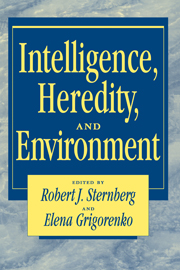Book contents
- Frontmatter
- Contents
- List of contributors
- Preface
- Part I The nature–nurture question: New advances in behavior-genetic research on intelligence
- 1 Behavior-Genetic and Socialization theories of intelligence: Truce and reconciliation
- 2 The puzzle of nongenetic variance
- 3 Identifying genes for cognitive abilities and disabilities
- 4 Heredity, environment, and IQ in the Texas Adoption Project
- 5 IQ similarity in twins reared apart: Findings and responses to critics
- Part II Novel theoretical perspectives on the genes and culture controversy
- Part III Specific issues in the nature–nurture controversy
- Part IV Integration and conclusions
- Name index
- Subject index
5 - IQ similarity in twins reared apart: Findings and responses to critics
Published online by Cambridge University Press: 05 June 2012
- Frontmatter
- Contents
- List of contributors
- Preface
- Part I The nature–nurture question: New advances in behavior-genetic research on intelligence
- 1 Behavior-Genetic and Socialization theories of intelligence: Truce and reconciliation
- 2 The puzzle of nongenetic variance
- 3 Identifying genes for cognitive abilities and disabilities
- 4 Heredity, environment, and IQ in the Texas Adoption Project
- 5 IQ similarity in twins reared apart: Findings and responses to critics
- Part II Novel theoretical perspectives on the genes and culture controversy
- Part III Specific issues in the nature–nurture controversy
- Part IV Integration and conclusions
- Name index
- Subject index
Summary
Research on genetic influence on intelligence has a long and contentious history (Brand, 1993; Fancher, 1985; Kamin, 1974). Both the idea of a general factor of cognitive ability, Spearman's g, and the idea that genetic factors might be an important source of variance in cognitive ability have been continuously debated since they were first systematically expounded by Galton (1869, 1876). Reviews of Galton's books published in the London Times at the time of their appearance could, if slight changes were made, be published today. The debate on the nature of mental abilities and the influence of heredity on such abilities (as well as most other psychological traits) initiated by Galton continues unabated.
The current status of g
There should be no doubt that the issues of the measurability of IQ and its usefulness are still controversial issues. Consider the following recommendation regarding the measurement of abilities and other psychological traits:
Make explicit to everyone (pupils, parents, public and professionals of all kinds) that a person's abilities, activities, and attitudes cannot be measured. The public, especially, misperceive that hard data exist, and that test scores constitute these data. The public does not realize how quickly the point is reached where we do not know how to discriminate validly among people, but where data mislead us to think we do. This is what is meant by the myth of measurability
[Tyler & White, 1979, p. 376].- Type
- Chapter
- Information
- Intelligence, Heredity and Environment , pp. 126 - 160Publisher: Cambridge University PressPrint publication year: 1996
- 8
- Cited by

